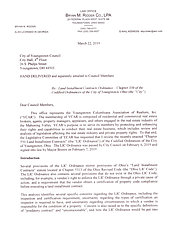Real estate association calls for Youngstown to halt its land-installment contracts legislation
Measure toughens laws for land-installment contracts
YOUNGSTOWN
An attorney for 554-member Youngstown Columbiana Association of Realtors Inc. is calling for the city to halt its land-installment contracts legislation, contending it is flawed.
In a letter to city officials, Atty. Bryan M. Ridder wrote: “The deficient, redundant and conflicting provisions, and other apparent drafting errors” show that the ordinance “was rushed to adoption without being carefully and thoughtfully vetted.”
Ridder added: “In light of these significant shortcomings, [the association] urges the city to consider suspending enforcement of or repealing the LIC [land-installments contracts] ordinance and to re-examine issues related to land-installment contracts in the city of Youngstown in order to develop a more appropriate response to those issues.”
The association’s membership includes residential and commercial real-estate brokers, agents, property managers, appraisers and others involved in the real-estate industry in Mahoning, Trumbull and Columbiana counties.
Mayor Jamael Tito Brown said the legislation “is a work in progress. It’s not a perfect piece of legislation. We’re looking to add some amendments to improve it.”
But, Brown said, the city has no plans to “suspend or repeal” the legislation, but “we welcome suggestions for amendments.”
On Feb. 6, city council unanimously approved a bill to toughen the laws for land-installment contracts, which has a person pay the purchase price of a property in installments while the owner retains the title to the property. A day later, Brown signed the bill into law.
The changes include requiring an inspection and a title search before a sale through a land-installment contract is finalized. It also mandates the seller to provide the Mahoning County auditor’s tax statement on the property to the buyer, and allows for damages up to $5,000 to be collected when predatory lending is proven in addition to the buyer’s actual economic damage. In cases where the violation is “determined to be unconscionable by the court,” the buyer can rescind the transaction or recover three times the amount of the economic damages.
The legislation was approved at the longtime urging of members of the Alliance for Congregational Transformation Influencing Our Neighborhoods, the Youngstown Neighborhood Development Corp., block watches and neighborhood groups. The organizations expressed concern that many land-installment contracts are predatory.
In his letter, Ridder wrote there are “several specific concerns” from the association regarding the inspection, the types of certification an inspector is required to have and “uncertainty regarding circumstances in which a vendee is responsible for the condition of a property. Concern is also raised as to the specific definitions of ‘predatory contract’ and ‘unconscionable.’”
Among Ridder’s other suggestions is clarifying the requirement that a property owner obtain a certificate of property code compliance as a one-time requirement and not a continuing obligation.
 43
43

